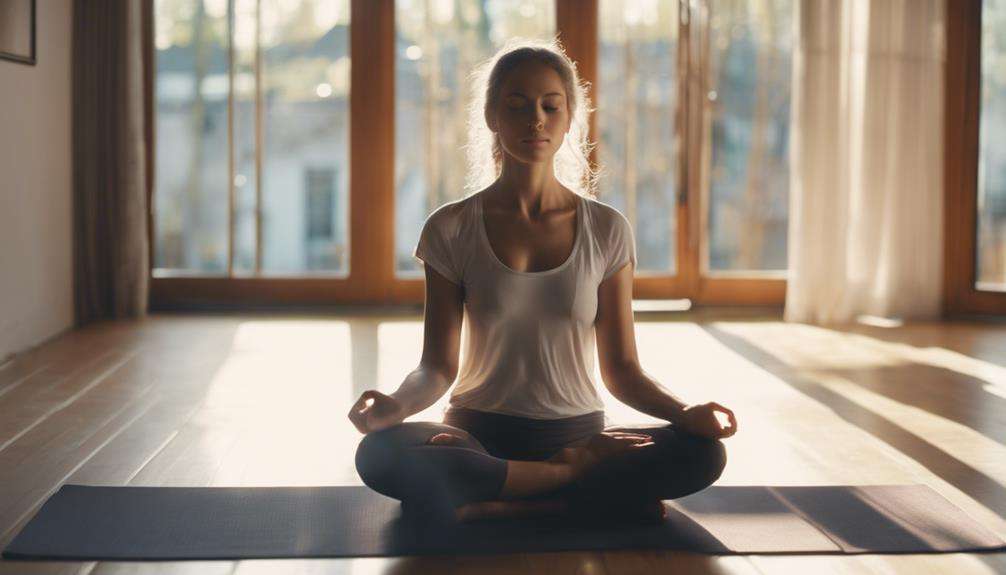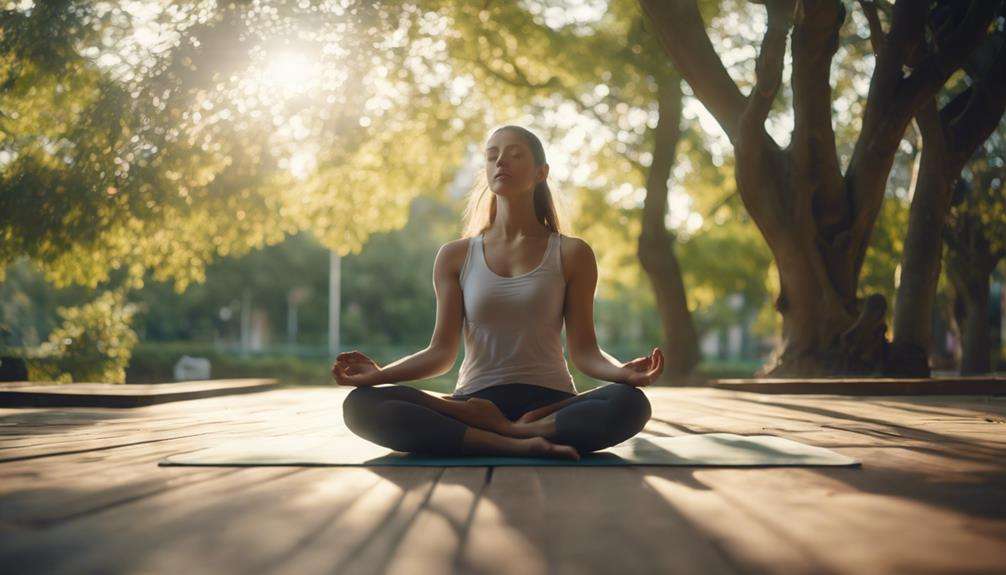Imagine depression as a dark cloud looming over your horizon, casting shadows on your every step. This guide offers a beacon of hope, shedding light on how yoga and meditation can be powerful allies in your battle against this internal storm.
By exploring the intertwined paths of ancient practices and modern science, you will uncover a transformative journey towards inner peace and emotional resilience. Discover how these age-old techniques hold the key to unlocking a brighter tomorrow for your mental well-being.
Key Takeaways
- Yoga and meditation decrease depression symptoms and modify stress responses effectively.
- These practices offer physical relaxation, activate the body's relaxation response, and enhance emotional balance.
- Yoga and meditation benefit individuals of all ages, providing relief, resilience, and improved coping mechanisms.
- Research supports the effectiveness of yoga and meditation in combatting depression, making them valuable tools for mental health.
Understanding Depression and Yoga
In exploring the intersection of mental health and holistic well-being, understanding depression alongside the principles of yoga provides a transformative lens into the potential for healing and self-discovery. Depression, often accompanied by anxiety, is a prevalent mental health condition that can significantly impact one's overall well-being. Yoga, an ancient holistic health system, offers a unique approach to addressing depression by focusing on the union of body, mind, and spirit through relaxation, physical movements, breathing practices, and meditation.
Numerous studies have highlighted the positive effects of yoga on mental health, particularly in managing depression. Yoga interventions have been shown to decrease depression symptoms, modify stress responses, and enhance overall well-being. Brain imaging studies have revealed that yoga influences brain structures related to depression and stress responses, leading to improved emotional regulation and self-perception. As a complementary therapy, yoga can enhance coping mechanisms and provide individuals with effective tools for managing their mental health more effectively. By incorporating yoga into their routine, individuals can take proactive steps towards combating depression and fostering a sense of inner peace and balance.
Benefits of Yoga for Depression
Yoga offers you physical relaxation techniques that can help alleviate the physical symptoms of depression, such as tension and fatigue.
By practicing yoga, you can enhance mental clarity and focus, enabling you to better manage negative thought patterns associated with depression.
These benefits of yoga provide a comprehensive approach to combating depression by addressing both the physical and mental aspects of the condition.
Physical Relaxation Techniques
Physical relaxation techniques found in yoga practice offer a gentle and effective means to alleviate symptoms of depression by promoting muscle relaxation and reducing stress levels. Through gentle movements, breathing techniques, and muscle relaxation, yoga provides a holistic approach to improving mental health and well-being.
Here are three key benefits of incorporating physical relaxation techniques into your yoga practice:
- Stress Reduction: Yoga helps calm the nervous system, reducing stress levels and promoting relaxation.
- Muscle Tension Relief: Yoga poses encourage deep muscle relaxation, alleviating physical symptoms of stress and anxiety.
- Cortisol Regulation: Regular yoga practice can lower cortisol levels, the stress hormone, leading to a more balanced state of mind.
Mental Clarity and Focus
Enhancing mental clarity and focus through yoga practice can significantly benefit individuals struggling with depression by fostering mindfulness and reducing racing thoughts.
The meditative aspect of yoga promotes a calm mind, helping individuals to ground themselves and alleviate symptoms of depression.
By incorporating mindfulness practices and yoga poses, individuals can sharpen their cognitive functions, improve decision-making abilities, and maintain mental clarity amidst emotional challenges.
The breathing techniques in meditation aid in fostering a sense of mental stability and resilience, supporting overall emotional well-being.
Regular practice of yoga not only enhances mental alertness but also helps individuals with depression to concentrate better and navigate their emotions with greater ease.
Managing Stress With Yoga Practice

By incorporating yoga practice into your routine, you can effectively manage stress by reducing cortisol levels and enhancing your overall well-being. Engaging in yoga postures and breathing exercises can activate the body's relaxation response, counteracting stress responses. Here are three ways yoga can help you manage stress:
- Lower Cortisol Levels: Regular yoga sessions have been shown to lower cortisol levels, which are linked to stress and anxiety.
- Enhanced Relaxation Response: Yoga promotes mindfulness and helps activate the body's relaxation response, leading to reduced perceived stress levels and improved emotional regulation.
- Improved Well-being: Studies have demonstrated that incorporating yoga into daily routines can significantly reduce stress and its related symptoms, ultimately enhancing your overall well-being.
Yoga Poses for Mental Health
To further enhance your mental well-being and emotional balance, exploring specific yoga poses tailored for mental health can offer valuable support and relief.
Certain yoga poses like Child's Pose, Legs-Up-The-Wall, and Corpse Pose are beneficial in reducing stress and promoting mental health improvement. These poses help relax the body and mind, allowing you to combat depression and find a sense of calm.
Inversions such as Headstand and Shoulder Stand can boost your mood by increasing blood flow to the brain and creating a calming effect. Backbends like Bridge Pose and Camel Pose help release tension and promote emotional well-being, reducing feelings of anxiety.
Balancing poses such as Tree Pose and Warrior III enhance focus, concentration, and stability, contributing to mental clarity and calmness. Seated poses like Lotus Pose and Easy Pose encourage mindfulness and self-awareness, fostering emotional balance and overall mental health benefits.
Practice these yoga poses regularly to support your mental health and well-being.
Meditation Techniques for Depression

Meditation techniques offer a powerful tool for managing and alleviating symptoms of depression. When it comes to combating depression, mindfulness meditation and loving-kindness meditation stand out as effective practices. Here's how they can help you:
- Mindfulness Meditation: By focusing on the present moment without judgment, mindfulness meditation reduces rumination, enhances emotional regulation, and promotes overall well-being. This technique helps in breaking the cycle of negative thoughts that often accompany depression.
- Loving-Kindness Meditation: Cultivating feelings of compassion and empathy towards oneself and others, loving-kindness meditation fosters a sense of connection and positivity. This practice can improve mood, enhance self-esteem, and combat feelings of isolation commonly experienced in depression.
- Incorporating into Daily Routine: Regular meditation practice can lead to changes in brain structure and function, ultimately enhancing mood and reducing depressive symptoms. By integrating these meditation techniques into your daily routines, you can have a portable and accessible tool for managing depression effectively.
Yoga and Neurobiology of Depression
When exploring the neurobiology of depression in relation to yoga, it becomes evident that the practice can impact brain structures involved in mood regulation.
By engaging in yoga, you're employing stress reduction techniques that influence the brain regions associated with depression.
The benefits of yoga extend to enhancing well-being and offering a holistic approach to managing depressive symptoms.
Brain and Yoga
In exploring the neurobiology of depression in relation to yoga, one can uncover how this practice influences brain structures and functions. Yoga interventions play a crucial role in shaping brain health and mental well-being. Here are three key ways yoga impacts the brain:
- Brain Imaging: Yoga can be linked to changes in brain structures through imaging studies, shedding light on its effects on depression-related regions.
- Neurotransmitter Levels: By influencing neurotransmitter levels, yoga promotes positive emotional regulation and self-perception, aiding in mood management.
- Chronic Stress and the Hippocampus: Yoga helps combat the atrophy in the hippocampus caused by chronic stress, ultimately enhancing mood regulation and overall mental health.
Understanding these mechanisms can provide insight into the profound impact of yoga on combating depression and promoting emotional well-being.
Stress Reduction Techniques
Exploring stress reduction techniques through yoga in the context of the neurobiology of depression reveals the profound impact of holistic health practices on mental well-being. Yoga, with its combination of relaxation, physical movements, breathing practices, and meditation, has been shown through brain imaging studies to modify stress responses, aid in depression management, and enhance overall health.
Mood Regulation Benefits
Yoga's impact on mood regulation and its connection to the neurobiology of depression highlights its significant role in promoting mental well-being and emotional stability. When considering yoga in depression management, it's crucial to understand its effects on stress responses and brain structures.
- Yoga interventions can enhance well-being, reduce stress perceptions, and alleviate depression symptoms.
- Brain imaging studies show how yoga influences specific regions related to depression, shedding light on its neurobiological effects.
- Yoga may target stress-related disorders by improving HPA axis activity, encouraging positive coping mechanisms, and mitigating the impact of chronic stress on mental health.
Embracing yoga as part of a holistic approach to mental health can offer profound benefits in mood regulation and overall well-being.
Combating Inflammation With Yoga
To combat inflammation effectively and support your mental well-being in addressing depression, incorporating yoga into your routine can be a beneficial and holistic approach. Chronic inflammation plays a significant role in mental health disorders like depression, making it crucial to find ways to lower these inflammatory markers.
Yoga offers stress-reducing and calming effects, which can help in combating inflammation throughout the body. Studies have indicated that specific yoga practices, such as breathing techniques and gentle movements, have the potential to reduce inflammation levels, providing a natural way to alleviate symptoms of depression.
Yoga for Gene Expression in Depression

Several yoga techniques have demonstrated the ability to positively influence gene expression linked to depression, impacting how specific genes are activated or suppressed. When individuals with depression engage in yoga practices, they may experience beneficial changes in gene expression patterns related to stress response and emotional regulation. Specific yoga techniques like postures, breathing exercises, and meditation have been shown to contribute to alterations in gene expression associated with mood disorders. Research suggests that regular yoga practice can help regulate gene expression involved in neurotransmitter function and mood stability in those with depression. The therapeutic effects of yoga on depression may, in part, be due to its ability to influence gene expression pathways associated with mental health and emotional well-being.
Benefits of Yoga for Gene Expression in Depression:
- Modulates gene expression patterns related to stress response.
- Contributes to changes in gene expression linked to emotional regulation.
- Helps regulate gene expression involved in neurotransmitter function and mood stability.
Enhancing Brain Chemistry Through Yoga
Enhancing brain chemistry through yoga involves positively influencing neurotransmitter levels, promoting emotional regulation, and self-perception, which can significantly impact mental well-being and overall health. Yoga practices such as meditation and controlled breathing can enhance neurotransmitter levels like serotonin and dopamine, which are crucial for regulating mood and emotions. By engaging in yoga, you can positively impact brain structures associated with depression and stress responses, potentially counteracting the effects of chronic stress on brain regions like the hippocampus. Additionally, yoga can improve vagal tone, reduce inflammation, and enhance brain chemistry through activities that focus on relaxation and mindfulness.
Research supports the notion that yoga interventions play a vital role in modifying stress responses, aiding in the management of depression, and promoting overall mental health. By incorporating yoga into your routine, you can harness its potential to optimize neurotransmitter function, improve self-perception, and enhance emotional regulation, all of which are essential components of combatting depression and promoting well-being.
Holistic Approach to Combating Depression

When addressing depression from a holistic perspective, it's essential to acknowledge the intricate connection between your mind and body.
By embracing natural healing methods like yoga and meditation, you can nurture your mental wellness and embark on a journey towards inner balance.
These practices offer a pathway to self-awareness, emotional resilience, and a renewed sense of well-being.
Mind-Body Connection
To combat depression holistically, yoga and meditation emphasize the vital mind-body connection, promoting relaxation, reducing stress, and enhancing mental well-being. Through these practices, individuals can develop a deeper understanding of their emotional resilience and increase self-awareness, aiding in the management of depressive symptoms.
The holistic approach of yoga and meditation integrates breath work, physical movement, and mindfulness, fostering a balanced mind-body connection crucial for alleviating depression. By engaging in these activities, you're actively working towards creating harmony between your body and mind, which can have a profound impact on your mental health.
Embrace the interconnectedness of your being through yoga and meditation to nurture a healthier mindset and combat depression effectively.
Natural Healing Methods
In the pursuit of combating depression through natural healing methods, embracing a holistic approach that integrates yoga and meditation can offer profound benefits for your mental well-being. The holistic approach emphasizes the mind-body connection, focusing on stress reduction, mental health improvement, and overall well-being enhancement.
Yoga and meditation provide tools to manage depression symptoms through relaxation, breathing practices, and mindful awareness, targeting emotional pain relief and fostering a positive shift in mood and perspective. By incorporating these natural healing methods into your daily routine, you can establish a supportive framework for alleviating depression and promoting mental wellness.
Embrace yoga and meditation as effective strategies for combating depression and enhancing your emotional and mental health.
Mental Wellness Practices
Utilizing yoga and meditation as integral components of a holistic approach can empower individuals in combating depression by nurturing mental wellness through mindful practices and physical engagement.
When focusing on mental wellness practices, consider the following:
- Mind-Body Connection: Yoga and meditation promote the connection between physical movements and mental well-being, aiding in managing depressive symptoms effectively.
- Research-Backed Benefits: Studies demonstrate that these practices can notably reduce depression and anxiety levels across various age groups and locations.
- Enhanced Treatment Approaches: Integrating behavioral theories and exploring the impact of yoga on diverse populations can optimize the effectiveness of holistic depression treatments.
Frequently Asked Questions
Can Yoga Relieve Symptoms of Depression?
Yoga poses can relieve symptoms of depression by improving mental health through mind-body connections. The benefits of yoga include stress reduction, meditation practice, and enhanced emotional well-being. It's a self-care technique that promotes overall wellness.
What Is a Strategy to Help Someone Who Is Suffering From Depression?
To help with depression, try incorporating mindful breathing, positive affirmations, nature therapy, creative expression, social support, a healthy diet, journaling practice, regular exercise, and professional therapy. These strategies can aid in managing symptoms effectively.
Is Yoga an Antidepressant?
Yoga benefits mental health by enhancing the mind-body connection. It acts as an alternative treatment, improving mood, reducing stress, and promoting self-care. With exercise therapy, yoga offers holistic healing, emphasizing the power of self-awareness in combating depression.
Conclusion
In conclusion, by incorporating yoga and meditation into your daily routine, you can take significant steps towards combatting depression and improving your mental well-being.
These practices act as a soothing balm for the mind, like a gentle breeze on a stormy day, helping you find peace and balance amidst life's challenges.
Embrace the power of yoga and meditation to nurture your mental health and embark on a journey towards holistic healing.






